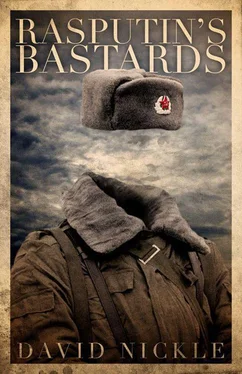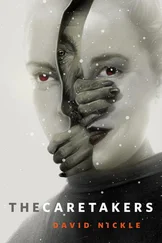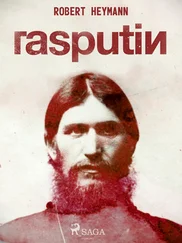“Why?” said Alexei.
“ Why .” Kolyokov inflated his cheeks. “What a question. I don’t know that I can say why — but I will tell you some reasons why not. Not because I wanted to live forever as a parasite in the hindbrain of the human race. Not because I wanted to turn Vladimir and yourself and everyone else into my slaves in some elaborate crime ring to con people out of their retirement money, or a group to aid sceptical secret agents in their quest to win the intelligence war with the United States. Why don’t we go indoors?” he said, pushing himself to his feet. “It is Goddamn freezing here.”
Alexei stood up too and followed Kolyokov, pushing the carriage over sheets of ice and little drifts of snow, while Northern Lights flickered like ghosts overhead. They came upon the school quickly. Kolyokov fumbled in his bathrobe for a key, opened the large sheet metal-covered door and led the way inside.
They stepped into a large gymnasium. Alexei smiled. He remembered how it was to play floor hockey there — feel the sting of the ball as it touched his fingertips on its way to the goal, the exhilaration of his cheering classmates. The floor was scuffed birch wood, with lines taped and lacquered onto it in red and blue and white. Long banks of fluorescent light hung on chains from a high ceiling. Their footsteps echoed as they crossed the room. Alexei inhaled the scent of sweat and socks. At least it was warmer.
“Was this,” asked Kolyokov, “such a wicked lie? Truly?” He peered at Alexei, and Vladimir, and then nodded sadly. “I suppose that it was. And so the question remains. Why?”
Alexei and Vladimir looked at Kolyokov, waiting.
“It was a sick game that we played with you. With our children.” Kolyokov smiled sadly. “I cannot blame you, Vladimir, for locking me in the room with that detestable Nazi — after the things that we did to you and the others. Those for whom you are truly an able advocate.” Vladimir squirmed in his chair. “Why, then do I do this? Try to bring you here? Well — I had hoped not to die. Not just yet. I had hoped to bring you here — teach you about things that your training might not have prepared you for. Teach you how to make your way in the world of senses — before I passed into death. Make some amends. Is that very foolish?”
Alexei shook his head. “What do you want — a fucking hug?”
Vladimir coughed.
“Kolyokov,” said Vladimir, in a clear, high voice, “you are a big bastard and you deserve to be eaten.”
Kolyokov shook his head. “My child, do not waste your last words to curse a dying man.”
“My last words? I do not think so.”
“Ah but they are. You had a fine vision, boy — but unattainable. You cannot free the sleepers and the dream-walkers alike. They cannot in the end coexist. Babushka has shown you that.”
“Babushka also deserved to be eaten,” said Vladimir. “As she was.”
Kolyokov shook his head sadly. “Ah, my beautiful boy,” he said. “My greatest regret is that I will never be alive to see you, the day that your own mind grows to a portion of the many minds you occupy now. At least,” he said, “you shall have your inheritance.”
And with that, the ceiling rumbled, and cracked — and the exploding consciousness of Stephen Haber ripped through the metaphor of Alexei Kilodovich’s childhood, and tore it to dust.
He was alone — for the first time in his life. Altogether alone.
He had vague recollections of another dream. A dream in which the world of his siblings and fore-parents was unshackled. Where all could pursue their dreams and their lives according to their wishes. That world was now upon them — and the baby wailed, as their dreams and wishes all receded from him.
But that was fine. For he understood as thought faded from his mind that this had been his purpose — that as much as he used these minds, he was their creation — a manifestation of their collective will. Now, that will dissipated. And Vladimir was left on his own. A mere baby.
The baby looked down at the floor. Two men lay on it — both staring with unseeing eyes ahead of them. They had been unshackled — the baby’s face scrunched as understanding came to him and fled again, as the large mind he used dissolved — so badly unshackled that they might never return. The one he could not weep for. The other, Alexei Kilodovich…
That was someone worth mourning, from the baby’s perspective.
“There there.” A big smelly man picked him up and held him. “There. Let’s go find your mama,” he said. “I bet she’s not far.”
By the time they got to the bottom of the stairs, the kid had stopped crying. His mother, whom he no longer recognized by name, stood outside the building next to a skinny boy and a pretty blonde lady. He put out his arms and waggled his fingers. The man who carried him was being nice to him, but he still didn’t like the way he smelled so he let his mother take him away.
First, she thought:
I die.
Kolyokov’s pawn has killed me. Me! Snuffed out like a candle!
And thinking these thoughts, she despaired.
But she need not have. For what she was doing was not dying. She was drifting across and through the salinity of the world, like a sea-dense Medusa trailing her rage in poisonous tentacles beneath her in a way that reminded her of the early days — which she remembered more clearly now in the hyper-conductive medium as they called it at City 512, the place where dreamers would drown, where thought would spin away in the call of whale song, in plankton, shrimp — a rage that she dangled across the insensate few who could hear her pleas as she flew the cold night sky, a rage that motivated armies in her stead, a rage that finally drove her to isolation on the shores of the New World.
Why , she wondered, do I not die ?
Green shafts of light passed through her as she spread and sighed in the sea, and for a moment, a kind of peace came over her. The peace that comes of warm bathwater, running through nostrils and filling the lungs, stilling a medicated sensorium. Rage was not all she had, in those days. For rage is not born of itself.
It is born of love.
Ah , she thought, love .
Memories drifted through her gossamer substance like drowned cruise ship passengers. Stupid Vasili; sanctimonious Fyodor; her children and grandchildren and great-grandchildren, on whom she doted, and who danced for her in death.
And so it was, holding these thoughts near to her — Babushka entered the brine of the sea, and insensate…
She began to spread.
Alexei Kilodovich looked up at the face: slim and tired and very sad. He blinked and frowned. “I am sorry,” he said to her. “I failed you.”
Her frown deepened. “Failed me?”
Alexei nodded and coughed. “I left you to the gangsters,” he said. “On that boat. I was stupid. A child hit me on the head.” He rubbed his chin, which was thick with a growth of beard. He felt cold and shaky — he had some new injuries. They were probably from being manhandled after they’d knocked him unconscious. “I thought you might be dead. You may have my resignation.”
“You—” Mrs. Kontos-Wu sat back. Alexei pushed himself up. He was lying on a rough wooden floor in the middle of a round room, with windows everywhere. “You are resigning?” she said.
“You may have my resignation,” he repeated, and then said, “Where did you get those clothes?”
“On the submarine,” said Mrs. Kontos-Wu.
Alexei stared at her. “Submarine?”
“Sure,” said Mrs. Kontos-Wu. “Don’t you remember?”
“No,” said Alexei. “I remember nothing.”
Mrs. Kontos-Wu looked at him, peering close as though trying to see something he’d caught in his eye. Then she put her arms around his shoulders, and held him. Alexei thought he must have been very glad to see his employer healthy and alive after all. That was the only way he could explain the tears.
Читать дальше












